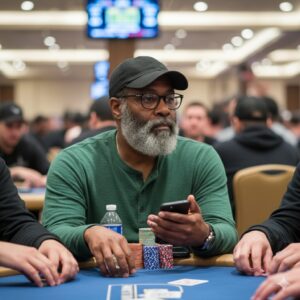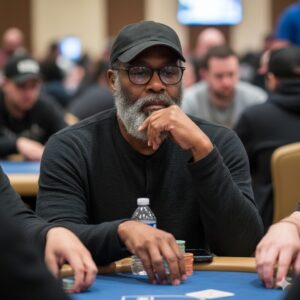Featured Player – DeShawn Price
DeShawn “Shawny” Price spends most of his time behind a chair, a barber’s chair, not a chip stack. Even here—midway through Day 2 with 780,000 in front of him—he carries the conversation the way he carries his shop in Madison, Wisconsin: calm, conversational, and neat around the edges. His card cap is a miniature barber pole that he places on his cards the same way he sets a comb on a clean towel—precise, ritualized, ready to work.
Price is thirty-nine and already a neighborhood fixture. He opened his barbershop at twenty-six, weathered street construction that killed foot traffic, and came out the other side with a book of loyal clients who bring their sons, uncles, and stories to his five chairs. On Sundays he hosts family dinner—cousins, Auntie Mae’s mac and cheese, a crockpot that never leaves the counter. “That’s my reset,” he tells me. “You burn a week cutting, arguing about the Bucks or the Packers, and squeezing poker in at night, you need Sunday to remind you what you’re working for.”
He’s played cards since high school basement games—five-dollar buy-ins and silly bluffs—but the serious pivot came four years ago when the pandemic shock faded and his business found its rhythm again. He carved out late nights in the card room and early mornings with a notepad, studying bet-sizing patterns and live tendencies. Solver talk doesn’t light him up; people do. “You don’t have to solve a person,” he says. “You have to notice them. How they count chips, how much they bet under pressure, if they always go to a round number when they’re bluffing. If you see one thing that’s off and act on it, that’s your rent.”
The results soon followed. In a $600 regional last spring he found a final table and turned a middling stack into second place because he leaned into an exploit: a table of tight regulars who shoved only premiums. Price floated them to death, picking off river bluffs with third pair and value-betting hands many players check back. That score—$27,400—paid for fresh signage for the shop and a few months’ worth of “scholarship haircuts” he gives to high school seniors before prom. By fall he’d added a $14,800 return from a $1,100 event in Minnesota, and a smattering of four-figure cashes that built confidence. He doesn’t track a formal bankroll so much as he runs a balance sheet in his head: shop overhead, crew pay, daycare for his toddler, and a poker line item that gets fed only when business is good.
 What separates Price in the room isn’t volume; it’s his table talk paired with discipline. He’s chatty—about the Bucks, about a new pool cue he’s breaking in after hours—yet there’s a cadence to it. His questions are short. His jokes land in the beats between hands, never while he’s in the tank. When pots swell, the banter drops out of his voice like a fader on a mixing board. More than once I watched him talk a recreational opponent into choosing a bet size, then snap-call because that specific size, from that specific player, signaled a capped range. “If you’re listening,” he shrugs, “they’ll tell you how much the bet means to them.”
What separates Price in the room isn’t volume; it’s his table talk paired with discipline. He’s chatty—about the Bucks, about a new pool cue he’s breaking in after hours—yet there’s a cadence to it. His questions are short. His jokes land in the beats between hands, never while he’s in the tank. When pots swell, the banter drops out of his voice like a fader on a mixing board. More than once I watched him talk a recreational opponent into choosing a bet size, then snap-call because that specific size, from that specific player, signaled a capped range. “If you’re listening,” he shrugs, “they’ll tell you how much the bet means to them.”
He carries that instinct into sizing wars. One orbit this afternoon he defended the big blind against an early open and a button call. On a 9♦-5♠-2♣ board he check-raised small—an amount that dared a call but said nothing definitive. When the turn paired fives and his opponent fired large, Price matched the story with a flat, then overbet the river when a harmless three hit. The opener couldn’t articulate why he folded kings face-up; he only knew the number didn’t feel right. That’s the seam Price mines: he watches the arithmetic people reach for when they’re nervous and pushes them into it.
Away from the felt, the same intentionality runs through the daily grind. Shop opens at nine, closes at six, bookkeeping till seven, a bath and bedtime for his daughter by eight. Twice a week he shoots pool till midnight—“Cue work makes you breathe before you move”—and on the drive home he records a voice memo cataloging hands and reads. His “study group” is a rotating threesome of local grinders who meet at his back station after hours, huddled around a laptop among clipper guards and aftershave. They’ll replay spots while he cleans shears. “If I’m not learning,” he says, “I’m just gambling. My neighborhood didn’t raise me to donate.”
The barber-pole cap is more than a gimmick; it’s a reminder. The shop paid for the game, and the game now pays it back—in buzz, in clients who came for a fade and stayed for a sweat. His near-term goal is simple and loud: satellite into a $3,500 main and get under the lights, streaming cards up with “Shawny” stitched on a patch his cousin made. Not for the ego, he insists, but for the look it would put on his daughter’s face when she sees Dad on the TV in the shop window. “I want the kids on my block to see there are lanes,” he says. “You can cut. You can coach. You can play. But whatever you do, do it clean.”
Tonight he bags 780,000—orderly stacks, edges squared—as if he’s lining up guards on a clipper. The room is loud, but his corner is still. He sets the tiny barber pole on top of the bag like a signature and finally exhales. Tomorrow, he’ll go back to noticing: the nervous counts, the round numbers, the stories people give away when they’re trying to tell a different one. And if the deck cooperates, he might just buy himself a new chair.

